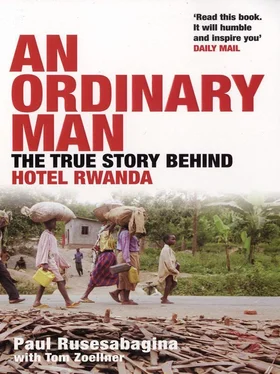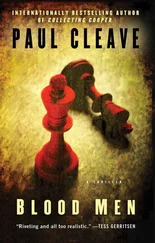The year before Gerard was expelled there had been chaos and death in the neighboring country of Burundi, a nation with an ethnic composition very similar to Rwanda. The president, a former Army captain named Michel Micombero, had ordered his armed forces to crack down on a Hutu uprising, and these soldiers took their mission beyond the bounds of rationality. Nearly two hundred thousand people were slaughtered and even more fled their homes for the relative safety of my country. We have a saying: “Whatever happens in Burundi eventually spills over into Rwanda, and whatever happens in Rwanda will also spill into Burundi.”And that was certainly the case in 1973.
The government in Rwanda was sympathetic and began taking reprisals against Tutsis as a kind of revenge. Several dozen were massacred with knives and machetes in villages near the border. Others lost their houses and their businesses. The younger ones were kicked out of the schools. One of them was my friend Gerard.
I will never forget the last time we walked to school together. When we arrived there were lists of names tacked to the bulletin boards outside the classrooms. Gerard’s name was there. He was told to take his things and go-he was not wanted at the school any longer. A group of Hutu students stood in front of the classroom door as a human wall to block the undesirables from going inside. These were the same children who had laughed, played, and gossiped together just twenty-four hours before. Now they were being divided in a way that was not fully comprehensible, but I will never forget the look of determination-even glee-on the part of some of my classmates who were accepting their new superior role all too readily.
I stood alone on the grassy quadrangle and watched Gerard walk back down the lane toward his home. That was the last I saw of him for a very long time.
His name was on the list because his mother was a Hutu and his father was a Tutsi. My name was not on the list because my mother was Tutsi and my father was a Hutu. Since ethnicity passes through the father’s loins in Rwanda, according to this idiotic logic Gerard was considered a despicable Tutsi and I was considered a privileged Hutu. Had the parentage been reversed it would have been me walking down that lane of guava trees with my head down.
I cannot tell you how much I loathed myself that day for having been lucky. It was the first time I became aware of myself not as “Paul” but as a “Hutu.” I suppose this dark epiphany is an essential rite of passage for anyone who grew up in my country, one of the most physically lovely places on the globe, but one with poison sown in its heart.
I have to tell you more.
One of those beads I mentioned on our necklace is 1885. This was the year of the famous Conference of Berlin, which put the seal on what was to become nearly seven decades of colonial government in Africa. This was also where Rwanda ’s fate was to be determined.
Representatives from Austria-Hungary, Denmark, France, Great Britain, Spain, the United States, Portugal, Holland, Sweden, and Norway met to sort out the conflicting claims their agents had made to vast pieces of real estate in Africa-most particularly, the forests of the Congo that had been turned into a private reserve for King Leopold II of Belgium. The Berlin conference was remarkable not just for the lack of African participation, but also for laying out a few key principles. The first was that a European nation couldn’t just draw lines on a map and claim that area as a protectorate. They had to prove they could “effectively occupy” and defend that territory. The second was that if a navy could seize a piece of coastline it would also have the rights to whatever lay inland for a virtually unlimited distance. The African continent was then sliced up with borders that frequently had no logical relation to watersheds, trade patterns, linguistic groups, or geography. Remarked the British prime minister: “We have been giving away mountains and rivers and lakes to each other, only hindered by the small impediment that we never knew exactly where they were.”
Rwanda fared well in some ways-at least, better than most of our neighbors. The borders shaved some corners from the rugged area claimed by the mwami, but we retained a certain amount of territorial integrity. Our colonizing power would be Germany, a nation that generally did not share the worst rapacious tendencies of some of the other conquerors of Africa. They had won our aerie as a compromise and they showed little interest in taking advantage of what little natural resources we could offer them. It took German agents more than nine years to arrive in Rwanda and thirteen before they finally got around to establishing an administrative office. Our nation was assigned to the same colonial department as the neighboring nation of Burundi and renamed Ruanda-Urundi.
The Germans looked on their new possession with indifference. It was a country far from the ocean. The most important provision of the Berlin Conference-the one that required “effective occupation”-was also a problem. The government of Otto von Bismarck simply did not see the value in sending a large portion of its army and civil service to rule a poor chunk of landlocked farmland. What this meant, in effect, was that the kaiser’s flag flew over our country as a matter of appearance, but the real power continued to be the top-down apparatus run by the Tutsi royalty. After the Germans’ catastrophic loss in World War I we were handed over as a spoil of war to the government of Belgium. That was the beginning of real change, for the Belgians showed more of an interest in us.
Belgium wanted to get the most profit out of Rwanda while expending the least amount of men and effort. The new colonizers looked at the social rift between our leaders and farmers and saw an easy way to rule by proxy. It was a version of the old divide-and-conquer tactics used so effectively by colonizers throughout history. The Aztec empire in Mexico was finished the moment that Hernán Cortés realized he could exploit minor resentments between tribes to his own advantage, making friends with one tribe to beat the more powerful rival and thus subdue the entire region for the Spanish Crown. And so the Belgians adopted the bizarre race theories of John Hanning Speke to turn the Tutsi aristocracy into something like junior managers. It was no longer enough to simply co-opt the royal court as the Germans had. There was now an explicitly racial way of separating the haves from the have-nots.
Here’s how crazy it became. Belgian scientists were sent down to Rwanda with little measuring tapes. They determined that a typical Tutsi nose was at least two and a half millimeters longer than a Hutu nose. This brand of “scientific” race theory led directly to a particularly dark bead on our necklace: the year 1933, when all people in Rwanda received identity cards known as books that specified their ethnic class. Years later these cards would become virtual death warrants for thousands of people, as we will see. But the immediate effect of these cards was to crystallize the racism into a Jim Crow system. Almost all the colonial administrative jobs were reserved for Tutsis. When categories were written down, it became harder for Hutu to pass as Tutsi, even after they had accumulated many cows.
The doctrine of Tutsi superiority was taught in schools, preached in churches, and reinforced in thousands of invisible ways in daily Rwandan life. The Tutsi were told over and over that they were aristocratic and physically attractive, while the Hutu were told they were ugly and stupid and worthy only of working in the fields. An early colonial film described the farming class as “souls sad and passive, ignoring all thought for the morrow” who viewed their Tutsi masters as “demigods.” This was the message that our fathers and mothers heard every day. One of the most distingished scholars on our nation, the American professor Alison Des Forges, has described the net effect this way: “People of both groups learned to think of the Tutsi as the winners and the Hutu as the losers in every great contest in Rwandan history.”
Читать дальше











![Paul Finch - A Wanted Man [A PC Heckenburg Short Story]](/books/702381/paul-finch-a-wanted-man-a-pc-heckenburg-short-sto-thumb.webp)
